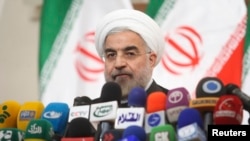Iranian President Hassan Rouhani has vowed his country will never pursue a nuclear bomb, in the latest sign the newly elected leader is open to improving relations with the United States.
In an interview from Tehran with NBC News, President Rouhani said Iran has never sought nuclear weapons and that it would under no circumstances "seek any weapons of mass destruction."
Rouhani also said his people should be free to think, speak and seek information on the Internet, subject to "the protection of our national identity." He said a "commission for citizens' rights" will be established "in the near future."
The Iranian leader spoke just days before he is to make his first appearance as president on the world stage when he attends the United Nations General Assembly in New York.
Iran has for years insisted its nuclear program is peaceful. The U.S. and some of its allies disagree, and have helped implement several rounds of sanctions that have battered Iran's economy.
Rouhani's election in June appears to have spurred new diplomatic outreach from Iran's ruling establishment.
In recent weeks, the Iranian leadership has sent Rosh Hashanah greetings to Jews worldwide via Twitter, released political prisoners, exchanged letters with U.S. President Barack Obama and transferred responsibility for nuclear negotiations from the conservatives in the military to the Foreign Ministry.
Some in Washington have been skeptical, saying true power lies with Iran's supreme leader, Ayatollah Ali Khamenei. But Rouhani said his government has "full power," "complete authority," and "sufficient political latitude" to solve the nuclear issue.
Barry Pavel a former defense policy adviser to Obama, tells VOA that Rouhani's recent statements reflect a "real opportunity" to engage Iran on its nuclear program.
"There is one senior decision maker, and that's the supreme leader," he said. :So in that sense, it appears that the proposals and engagement do have his direct sponsorship and support."
Pavel, who is the director of the Atlantic Council's Brent Scowcroft Center on International Security, says it is conceivable that Rouhani could come prepared to make further goodwill gestures.
"It's possible he'll make a dramatic concession. That would be the appropriate timing and venue. But there should also be discussion of this in the more confidential setting of the P5+1 talks," said Pavel referring to the five permanent members of the U.N. Security Council and Germany.
White House officials say there are no current plans for Obama to meet Rouhani during his visit. They have, however, acknowledged Obama recently exchanged letters with Rouhani - a rare step for the two countries, which do not have diplomatic relations.
In an interview from Tehran with NBC News, President Rouhani said Iran has never sought nuclear weapons and that it would under no circumstances "seek any weapons of mass destruction."
Rouhani also said his people should be free to think, speak and seek information on the Internet, subject to "the protection of our national identity." He said a "commission for citizens' rights" will be established "in the near future."
The Iranian leader spoke just days before he is to make his first appearance as president on the world stage when he attends the United Nations General Assembly in New York.
Iran has for years insisted its nuclear program is peaceful. The U.S. and some of its allies disagree, and have helped implement several rounds of sanctions that have battered Iran's economy.
Rouhani's election in June appears to have spurred new diplomatic outreach from Iran's ruling establishment.
In recent weeks, the Iranian leadership has sent Rosh Hashanah greetings to Jews worldwide via Twitter, released political prisoners, exchanged letters with U.S. President Barack Obama and transferred responsibility for nuclear negotiations from the conservatives in the military to the Foreign Ministry.
Some in Washington have been skeptical, saying true power lies with Iran's supreme leader, Ayatollah Ali Khamenei. But Rouhani said his government has "full power," "complete authority," and "sufficient political latitude" to solve the nuclear issue.
Barry Pavel a former defense policy adviser to Obama, tells VOA that Rouhani's recent statements reflect a "real opportunity" to engage Iran on its nuclear program.
"There is one senior decision maker, and that's the supreme leader," he said. :So in that sense, it appears that the proposals and engagement do have his direct sponsorship and support."
Pavel, who is the director of the Atlantic Council's Brent Scowcroft Center on International Security, says it is conceivable that Rouhani could come prepared to make further goodwill gestures.
"It's possible he'll make a dramatic concession. That would be the appropriate timing and venue. But there should also be discussion of this in the more confidential setting of the P5+1 talks," said Pavel referring to the five permanent members of the U.N. Security Council and Germany.
White House officials say there are no current plans for Obama to meet Rouhani during his visit. They have, however, acknowledged Obama recently exchanged letters with Rouhani - a rare step for the two countries, which do not have diplomatic relations.





